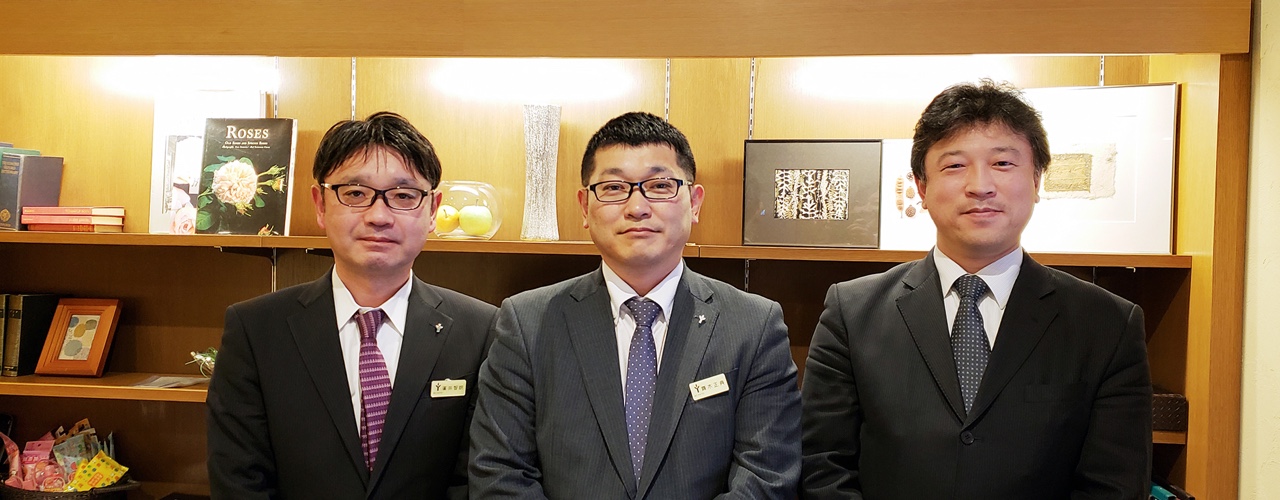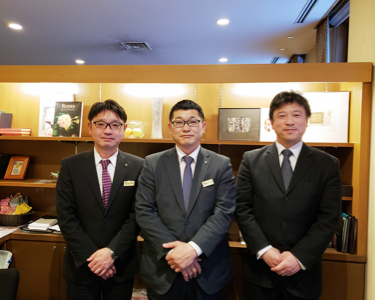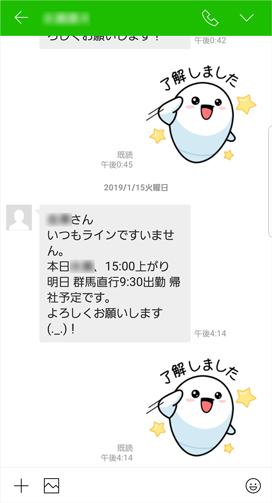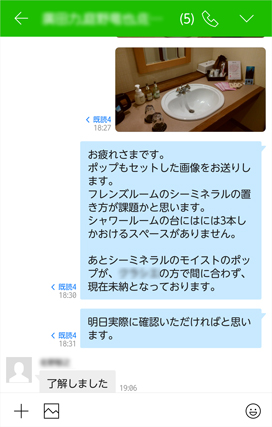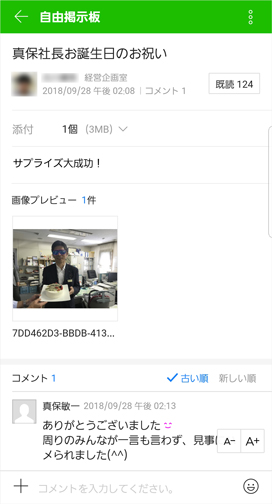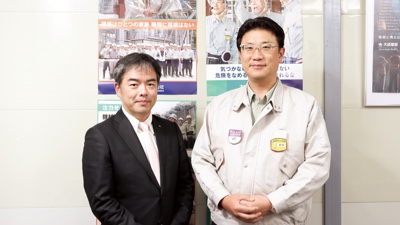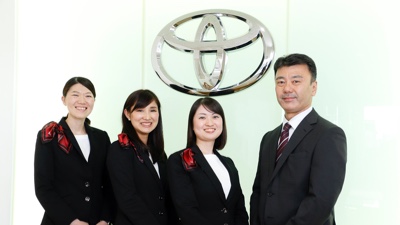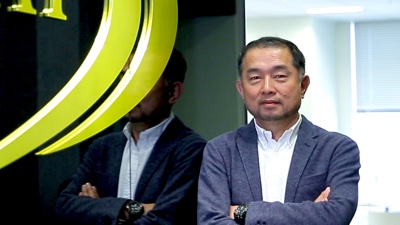Atema Kogen Resort Belnatio.,Ltd. operates ‘Atema Kogen Resort Belnatio’ visited by my customers from Japan and abroad. In order to provide heartwarming service to the consistently growing number customers as its popularity soars, it introduced LINE WORKS to ‘strengthen close communication and information sharing system among employees.’ We interviewed Hiroi and Kanazawa from the Management Department, and Saiki from the Guest Relations Department to hear how the company is utilizing the service.
Please tell us about your business, roles, and responsibilities
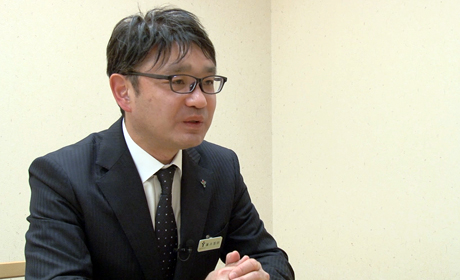
Mr. Hiroi:
Our company operates ‘Atema Kogen Belnatio’ accommodating a hotel, a golf course, and various nature activities in Tokamachi City, Niigata Prefecture. As a manager of the Management Department, I am in charge of general affairs and human resources, system operation, facility management, etc.
Mr. Kanazawa:
As the General Affairs·HR manager of the Management Department, I take care of system -related management such as salary, attendance check, and introduction and maintenance of PC. I am also involved in operating and managing LINE WORKS.
Mr. Saiki:
As a manager of the Guest Relations Department, I am in charge of overall customer service for resort facilities including hotel and restaurants.
What were some difficulties that you had before introducing LINE WORKS?
Mr. Hiroi:
Our resort started getting more spotlight after winning Gold for the ‘Rakuten Travel Award 2017,’ an award given to accommodations with exceptional user reviews. In order to provide and maintain quality service, employees need to communicate closely and share information seamlessly. Nevertheless, the risk of ‘shadow IT’—confidential information being leaked while employees share work-related information through mobile devices— has emerged as an important issue to be solved.
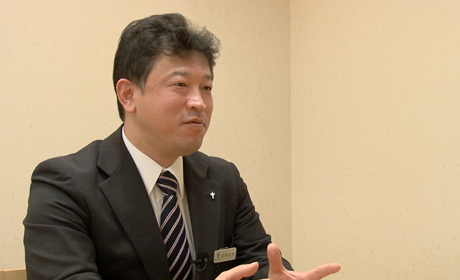
Mr. Kanazawa:
We used groupware technology to announce various kinds of information in the office, but checking them frequently was a challenge since information could only be accessed through a PC in your designated seat. As prompt sharing of information with employees in reception is a must to manage a resort, we had to consider an additional communication tool.
Mr. Saiki:
In the Guest Relations Department, we adjust the shift schedule of about 50 employees to match the number of customers each day. In order to do this, we contacted employees through phone or mail, but some staff off-duty could not be reached, and some employees who did not own company-provided mobile phones felt burdened to share their private phone numbers.
Please tell us why you chose LINE WORKS, and how your LINE WORKS integration was
Mr. Kanazawa:
After considering various tools, we took note of LINE WORKS, a service that allows users to share real-time information through mobile phones regardless of location, and which is certified with a global security standard of SOC. There were also some customers wanting to use LINE messenger to communicate with the hotel. We were attracted to the fact that it is a tool that can be managed by the company and also be integrated with LINE, and also that it does not require additional training because it has the same interface with the widely-used messenger, LINE. After trial operation with the CEO and the General Manager included, we could feel its convenience and improvement in work speed. Consequently, we decided to officially introduce the service. We opened around 200 accounts including part-time employees to utilize it for managing work shifts. As there were only a few employees provided with mobile phones from the company, we introduced the service as a BYOD (bring your own device), asking employees to download the app in personal mobile phones.
Mr. Hiroi:
The Management Department established basic operational regulations, such as restricting file downloads to mobile phones because of security issues, and stipulating that work-related contacts should be made only through LINE WORKS.
How exactly is LINE WORKS being used? Please tell us more about its effects
Mr. Kanazawa:
We have naturally come to use LINE WORKS when making work-related personal contacts, and groupware when delivering information across the enterprise. It is a rule not to carry a mobile device in reception except for the staff in charge of emergency contacts, so we asked employees to use LINE WORKS in the back yard. As a result, we could feel that information we needed to share with reception employees was being communicated faster than before.
Mr. Hiroi:
Unlike groupware where you have to access it to check information, we can receive a LINE WORKS alarm anywhere in the resort. This has significantly reduced the time it takes for sharing information, and in turn sped up the general work process.
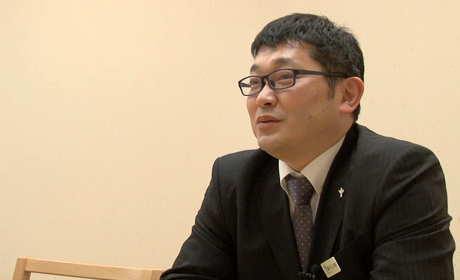
Mr. Saiki:
Every day, our resort runs five shuttle busses that connect hotels to various regions such as Tokyo and Niigata, and when the number of passengers increases due to sudden bookings, we also need to increase the number of customer service employees to prevent chaotic situations. After introducing LINE WORKS, it has become easier to ask night-duty personnel to come to work early, on bus arrival time. We can also contact employees with much ease and clarity when we urgently need to change work shifts, due to emergencies like sudden banquet reservations.
When we notice any damage in the facility and need to get approval for repair and changes in room layout, we send photos to our supervisor and ask for judgement. Before, we used to print out the photos or send them through groupware, so sometimes it took us two to three days for the supervisor to reply if he was on a business trip. After introducing LINE WORKS, we can get real-time instructions, as supervisors can immediately reply wherever they are.
Moreover, we created an ‘emergency network‘ group that includes every employee in the Guest Relations Department, and could quickly share information by contacting everyone at once at times of customer emergency like illness or injury. When calling an ambulance, we managed to build a system where employees with spare work time can quickly collaborate and handle the situation. We believe that boosting the speed for information sharing through LINE WORKS is also helping to make customers feel safe and reassured.
What kind of changes did you experience after introducing LINE WORKS, in terms of work environment and work style?
Mr. Hiroi:
With LINE WORKS, you can call someone whom you don’t have the number of. Moreover, I believe that there is more communication now with the use of message rooms, and teamwork improved.
Before, employees used to make reports and ask for consultations mostly through phone calls, but after the introduction of LINE WORKS we are using phone calls only in times of emergency—most other issues are delivered through messages. As we receive less and less work-related calls on the holidays, we can sense quality improvement in personal time.
How would you like to utilize LINE WORKS in the future?

Mr. Saiki:
I think we might utilize the integration feature for external conversations. Then we will be able to use the service for contacting buyers in the beverage sector. At the moment we are making contacts mostly through the phone, but if we could keep such conversations in record, we would be able to manage the order-to-delivery process more efficiently.
Mr. Hiroi:
I would like to use ‘Form’ and build a system where we can check employee status in case of emergency.
Moreover, every week, the management staff get together to report on what happened during the week— I would like to utilize voice and video call feature so that even employees in the Tokyo branch can take part and share information face-to-face. I believe that the risk of ‘shadow IT’ that has been a big challenge has decreased, but since it hasn’t been long since the introduction of the service, we plan to continue in our efforts to establish regulations to use LINE WORKS more safely, and to utilize its various features.
※ All details, affiliations, and positions specified were gathered at the time of interview.
